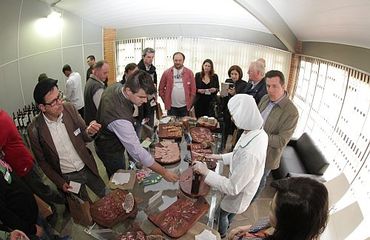São Paulo – The Brazilian Agricultural Research Corporation (Embrapa) has developed a line of cold cuts, sausages and other processed sheep meat products, such as raw and cooked ham, coppa, bacon and liver pâté, and it will launch soon a public tender offer to transfer the production technology used with these foods to a private company interested in producing them commercially.
“The idea is to promote and add value to sheep meat as a whole and not just lamb,” said the researcher of Embrapa Pecuária sul, Élen Nalério, coordinator of the project Full Utilization of Sheep Meat (Aprovinos). “In Rio Grande do Sul (where the Embrapa plant is located) there’s a habit of consuming the meat of older animals, but throughout Brazil there isn’t, only lamb,” she added.
According to her, this presents a problem to producers, since near 80% of the herd is made of adult rams and ewes and borregos, which are young sheep, but older than lambs. The project aims to enable new market alternatives to the meat of these animals, which has a stronger flavor than lamb meat.
Nalério points out that also taken in consideration was the possibility to offer these products to communities that have food restrictions due to religious matters. “A possible niche market could be the population that has restrictions to the consumption of pork,” she said. Many of the items developed during the research are originally prepared with pork.
Muslims, for instance, don’t eat pork due to religious beliefs. Brazil is currently a large supplier of beef and poultry to Islamic countries, especially Arabs, and halal slaughtering, done according to Muslim traditions, is widely used by Brazilian meat processing companies.
In the Arab world it’s common to find ham, bacon, sausages and other foods of this group done with beef or poultry, but sheep meat are very popular in the region. “There’s a possibility of [meeting the demand] a target group,” said Nalério.
According to her, the more intense flavor of older sheep favors its use in the making of these products, since lamb meat is milder.
The processes developed by Embrapa were based on the methods used to produce pork foodstuffs, but were adapted, since the meats have different characteristics. Pork coppa, for instance, can have up to 35% of fat, while sheep coppa has 27%. Besides, a large part of the sheep heard is grass-fed, while pigs are given feed.
The taste is different also. “We didn’t aim for a pork-like taste,” said the researcher. She says that if the tastes were alike, the products would go to the same market group and consumers would choose based on price, but the product line developed by Embrapa carries a higher price. “We put our coppa through tasting sessions and it had high levels of approval,” she said.
Among the products developed are Spanish raw salted ham and Italian ham, with the latter being salted and have spices added to the process, with both being smoked or not; coppas, smoked or not, that could also be dipped in wine or beer; bacon, or “oveicon” (word play with the word ovelha, meaning sheep), high quality, made with part of the loin and ribs, or the variety made of the belly; plus liver pâté, cooked ham, chopped ham products and hamburgers.
Some of these items were developed in partnership with other organizations such as the Sul-rio-grandense Federal Institute (Ifsul), the Farroupilha Federal Institute and universities.
The public offer to be issued soon will cover only the transferring of technology regarding the production of raw hams and coppas. “We are seeking an established company, entrepreneurs that can serve as catalysts for the stimulus process [of this market],” said Nalério.
Other products, such as the “oveicon”, according to her, still have to go through some other research phases.
*Translated by Sérgio Kakitani




